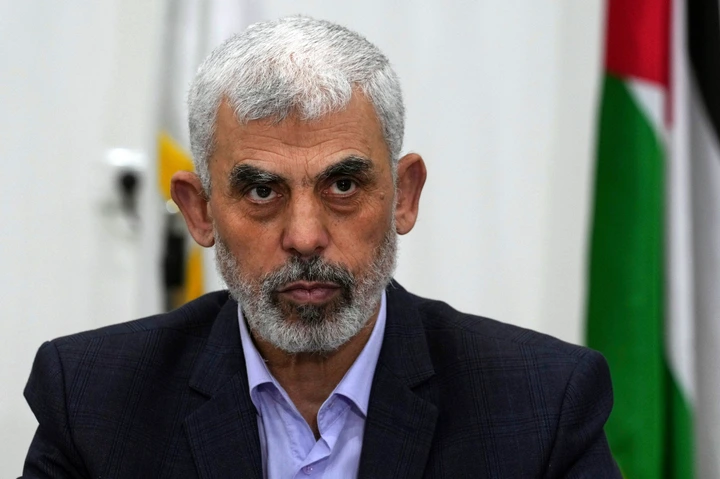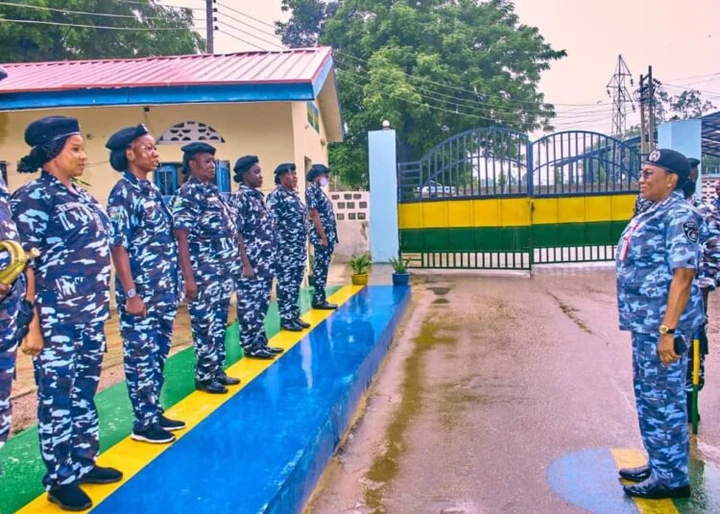Hamas names brutal mastermind behind October 7 attack Yahya Sinwar dubbed ‘Gaza’s Bin Laden’ as new leader
9–12 minutes ...READ THE FULL STORY FROM SOURCE ...READ THE FULL STORY FROM SOURCE
TERROR group Hamas has named Yahya Sinwar, the ruthless mastermind behind the deadly October 7 attacks, as their new leader.
Sinwar, dubbed Gaza’s Bin Laden, has taken over from former chief Ismail Haniyeh after he was assassinated by a suspected Israeli rocket last week
Evil Sinwar has been cowering out in the war-torn Gaza strip for months after he became the Israel Defense Forces primary target for his despicable role in the civilian massacre 10 months ago.
The Hamas boss is regarded as the architect of the assault that saw 1,200 people murdered and another 250 taken hostage.
Last man standing Sinwar has evaded Israeli assassination in Gaza during the ensuing war.
He is believed to be hiding in the tunnels under the city, used by the terror group to move, transport weapons and even hold hostages.
Hamas released a statement announcing Sinwar’s new role today.
The militant group said: “The Islamic resistance movement Hamas announces the selection of Commander Yahya Sinwar as the head of the political bureau of the movement, succeeding the martyr Commander Ismail Haniyeh, may Allah have mercy on him.”
Terror squad Hezbollah, who are backed by Israel’s enemy Iran, congratulated Sinwar as they sent out a chilling message.
The appointment “confirms goals that the enemy [Israel] seeks from killing leaders and officials failed in achieving its outcome”, they said.
Before saying it sends “a strong message” to Israel and the US that “the Hamas movement is united in its decision, solid in its principles, firm in its important choices, and determined” to continue to fight.
Sinwar’s ascendancy up the ranks is set to only anger the IDF and Israel’s PM Benjamin Netanyahu further.
Israeli forces blitz Hamas targets in hunt for ‘Gaza’s Bin Laden’
Israel’s military chiefs have repeatedly vowed that their renewed offensive must not end until he is dead.
US Secretary of State Antony Blinken told reporters today that Israel will have to come to terms with Sinwar’s new role as the “primary decider” in any Hamas related decisions.
Saying Sinwar will now play a crucial role in ceasefire talks.
A regional diplomat, who has been close to the ceasefire talks in recent months, added: “The appointment means that Israel needs to face Sinwar over a solution to Gaza war.”
Sinwar previously spent 22 years in an Israeli prison for terrorism, murder and kidnap plots before he helped orchestrate the October 7 massacre.
Wanted posters shared online, not by the IDF, previously appeared to offer a £25,000 reward to Palestinians who turned him in.
Bombshell documents previously revealed the chilling confessions of the warlord who, in his own words, described how he became a serial killer in Palestine as he rose through the terrorist ranks.
The secret documents from the Israeli Shin Bet intelligence service give detailed accounts of his killings – even reportedly showing where he had dumped and buried his victims’ bodies.
Encouraged by his proud mentor, he freely admitted his role with Majd – Hamas’ “security service” – as he took interrogators through each gruesome killing.
The shifting Hamas leadership comes just a week after Hamas’ political leader, Ismail Haniyeh, was assassinated in Tehran.
Early reports suggested a rocket fired from a drone in a feat of incredible precision took out the terror boss as he slept soundly in Iran’s capital.
Then an investigation by the New York Times suggested a bomb had been planted in his room at the military-run compound where he was staying and detonated remotely.
Unnamed Iranian officials also shared the explosive theory with The Telegraph, further confusing the murky details around Haniyeh’s death.
The hit came just days after the IDF announced that a strike on Khan Younis, southern Gaza, had killed Mohammed Deif on July 13.
The 58-year-old terror kingpin had worked as head of Hamas’ ruthless military wing, the al-Qassam brigades, since 2002.
Marwan Issa, Sinwar’s righthand man dubbed the “Shadow Man” for his ability to dodge assassination attempts, was also taken out this year.
He was killed on March 10 during an operation in the Gaza Strip, IDF spokesperson Daniel Hagari confirmed at the time.
Issa was the deputy commander of Hamas’ military wing and acted as one of Yahya Sinwar’s henchmen.
Ayman Nofal, Hamas’ commander in the centre of Gaza, was also taken out by an Israeli airstrike – but in October 2023.
Rising tensions in the Middle East
By Ellie Doughty, Foreign News Reporter
TENSIONS in the Middle East have long been a fluctuating and dangerous area of global concern.
Conflict between Israel and Palestine in the Gaza Strip, West Bank and on Israeli territory itself is nothing new.
Iran and Israel have long been in conflict with each other too.
But after a brutal terrorist attack by Hamas on Israeli soil in October last year, things entered a new phase.
Israel hit back like never before, unleashing almost ten months of ground warfare and airstrikes on the decimated enclave in a bid to destroy Hamas and rescue its hostages.
The Iran-backed terror group had killed some 1,200 Israeli people and kidnapped 250 more in the hideous October 7 massacre.
The UN estimates that at least 39,000 people have been killed in Gaza since the fresh war there broke out.
This figure includes data from the health ministry in Gaza which falls under Hamas domain and has sparked concerns from officials about accuracy.
Now, after almost ten months of war in Gaza, tensions have appeared to enter an all new high after a series of deadly strikes and high-profile assassinations in late July and early August.
On Saturday July 27, a rocket strike fired from southern Lebanon hit a football pitch in Golan Heights – a Druze village occupied by Israel – killing 12 young people including children.
Israel and the US both said Hezbollah, the largest of Iran’s terror proxy groups, operating out of Lebanon, were responsible for the deadly strike.
On Monday July 28, the IDF dropped an airstrike on an area of Beirut, Lebanon’s capital, killing Hezbollah’s most senior military commander Fuad Shukr.
Less than two days later, at around 2am on Wednesday July 30, Israel killed Hamas’ top political leader Ismail Haniyeh as he slept in Iran’s capital Tehran.
Israel has yet to explicitly claim responsibility for the hit, but after vowing to take out all of Hamas last year, they are widely believed to be behind it.
US officials have also said they suspect Israel of being behind the assassination.
On the morning of Thursday August 1 morning the Israeli Defence Forces (IDF) announced that a strike on Khan Younis, southern Gaza, had killed Mohammed Deif on July 13.
Dief had worked as head of Hamas’ ruthless military wing, the al-Qassam brigades, since 2002.
It marked another major loss for Iran’s terror proxy groups in the region.
Early reports this week suggested Ismail Haniyeh was taken out in a precision strike, when a rocket was fired from a drone outside his window and detonated inside the room.
Then an investigation by the New York Times suggested a bomb had been planted in his room at the military-run compound where he was staying and detonated remotely.
Unnamed Iranian officials also shared the explosive theory with The Telegraph, further confusing the murky details around Haniyeh’s death.
The Iranian Revolutionary Guard Corps (IRGC), concluded its investigation into the humiliating security breach on Saturday August 1 and said he died after a “short-range projectile” was fired from outside the building.
A statement shared on Iranian state TV said a 7kg rocket warhead was used in the attack.
Iran and its proxy groups; Hamas in Gaza, Hezbollah in Lebanon and the Houthis in Yemen all vowed to seek revenge on Israel over the assassination of Haniyeh.
Then, on the night of Saturday August 3, Hezbollah fired some 30 rockets from Lebanon towards Galilee in northern Israel.
Tel Aviv’s impressive Iron Dome Defence system launched into action, destroying “most” of the missiles and no one was hurt.
But the UK, US and France have all urged their citizens to evacuate from Lebanon as fears of a wider war breaking out in the region continue to spiral.READ THE FULL STORY HERE




